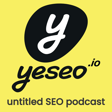
Embracing SEO and Knowledge Panels with Austine Esezobor
In this episode, we delve into the intriguing world of SEO and explore the niche area of knowledge panels with Austine Esezobor, an experienced SEO consultant and Google knowledge panels specialist. Austine shares his journey from aspiring music producer to becoming a seasoned professional in the digital marketing sphere, particularly focusing on SEO.
Austine Esezobor is an SEO Consultant who specialises in attaining and managing Google Knowledge Panels. He is also the Founder and Host of the Democratizing SEO podcast.
https://www.democratizingseo.com/about/austine-esezobor/
https://www.linkedin.com/in/austineesezobor/
Austine's SEO Journey
Austine is a musician and producer who has transitioned to digital marketing after being intrigued by the possibilities of SEO. He explains how SEO captivated him due to its blend of creativity, methodical planning, technical skills, and analytical thinking. Austine describes his process of self-education in SEO, which eventually led him to pursue it professionally.
Insights into Knowledge Panels
Throughout the conversation, Austine emphasises the significance of knowledge panels in the realm of SEO. He believes that knowledge graphs, which represent how search engines view relationships between different sets of data, are going to be fundamental to the future of search. This idea extends beyond traditional search engines like Google to encompass other platforms with search functionalities, such as Netflix and TikTok.
Austine suggests that knowledge graphs allow for a more structured delivery of information, making them crucial for businesses aiming to improve their online visibility. He discusses how entities—whether individuals, brands, or organisations—play a vital role in this new SEO paradigm by ensuring that they are correctly represented and connected within these graphs.
The Evolution of SEO
The discussion also touches on the evolution of SEO practices and how the focus has shifted from simple keyword optimisation to a more complex understanding of content and user intent. Austine explains that the future of SEO may rely heavily on providing direct answers to user queries rather than just listing possible sources of information, a shift from "search results" to "search answers."
Recommendations for SEO Practitioners
For SEO practitioners and business owners, Austine recommends adjusting strategies to focus more on visibility and entity representation rather than traditional metrics like keyword rankings. He advises that embracing this shift and understanding the importance of knowledge panels will be crucial for staying relevant in the rapidly changing landscape of digital marketing.
Conclusion
This episode provides valuable insights into the less-discussed areas of SEO and digital marketing strategies, particularly the use of knowledge graphs and panels. Austine’s expertise and forward-thinking approach offer a fresh perspective on how businesses can optimise their online presence in an increasingly competitive digital world.


